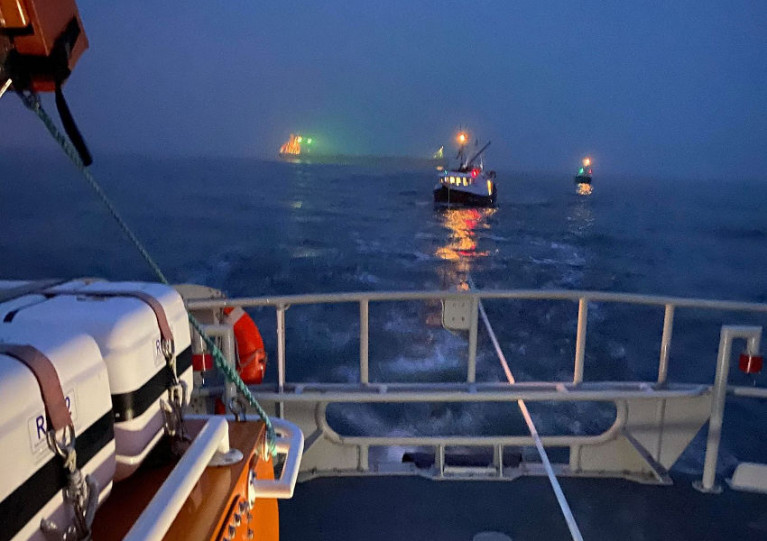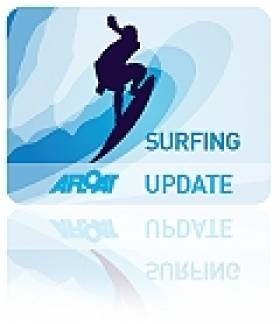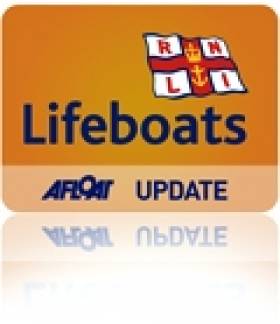Displaying items by tag: Tynemouth
Fishing Boat Sinks After Collision with Cargo Ship Off England’s North-East Coast
A fishing boat has sunk after a collision with a cargo ship off England’s North Tyneside coast.
The incident occurred at 3.40pm on Sunday afternoon (9 November) just under a mile (1.6km) north of the Tyne piers.
The skipper of the 9.9m North Shields-based trawler made a distress call after the collision with a 17,000-tonne, 81m cargo ship that had recently sailed from Blyth.
The fishing vessel was badly damaged and started taking on water, leading to flooding in the engine room, as Tynemouth RNLI reports.
Tynemouth's all-weather lifeboat with a crew of six volunteers reached the scene just five minutes after launch and attempted to save the vessel with a salvage pump.
A number of other nearby vessels also responded to the distress call. The offshore support vessel Ocean Marlin launched a daughter boat in case the fishermen needed immediate evacuation.
As the water levels inside the boat dropped, the decision was made by the lifeboat coxswain to tow the trawler back to Royal Quays Marina in North Shields, where she could be quickly lifted out of the water.
Unfortunately, once under way at a very slow speed, it became clear the boat was so badly damaged that the movement increased the water ingress.
In a final attempt to save the fishing boat, Tynemouth RNLI's inshore lifeboat was launched with an extra salvage pump. But while it was en route the trawler started to lose stability it was quickly evacuated.
The all-weather lifeboat took the fishermen back to safety at North Shields while the crew of the inshore lifeboat stayed on scene where the fishing vessel sank soon after.
Later the all-weather lifeboat returned to recover the fishing vessel's life raft, which had automatically detached and inflated but was immersed in seawater and would have become a hazard to shipping if left afloat.
A search for any other floating debris was carried out but none was found.
“This was a potentially life-threatening situation and our volunteers responded as quickly as possible,” Tynemouth RNLI spokesperson Adrian Don told Chronicle Live.
“Thanks must also go to the other vessels in the area that responded to the situation.”
Young Bundoran Surfer Joins Northcore Stable
#SURFING - Irish surfer Conor Maguire is one of the four new waveriders from the UK and Ireland to become part of the Northcore stable. In the vid below Maguire is mentioned at 2 minutes 11 seconds.
The Bundoran resident joins Sandy Kerr of Tynemouth, England, Craig Burrows of south Wales and Jersey's Charlotte Bayliss on the team heading into 2012.
The young surfer is already making a name for himself on the heavy waves of Ireland's northwest coast like the Peak, and regularly paddling into the meanest of Ireland's slabs such as Rileys.
Maguire is also starting to charge in the big swells, learning the tow-in craft from some of Ireland's most experienced big wave crews, including Northcore ambassador Richie Fitzgerald.
A Northcore spokesperson said of the recent additions: "Between them there's a huge amount of experience, style and skill. All of the riders are representing the very best of surfing talent from their respective home locations and all have achieved respect and recognition on a national scale."
Planet Jupiter Mistaken for Distress Flare
A extensive rescue search in northeast England was called off on Monday when it was found that the planet Jupiter had been mistaken for a distress flare.
BBC News reports that Tymemouth RNLI lifeboat and an RAF rescue helicopter had been dispatched to search for a possible vessel in distress after a call from a member of the public on Monday evening.
But on establishing further details from the informant "it became apparent that the flares were in fact the planet Jupiter which is very low in the sky at this time of year", said Tynemouth RNLI's Adrian Don.
The RNLI stresses that the false alarm was made with the "best intentions" and urges anyone who thinks they have spotted a vessel in distress to contact emergency services.
































































